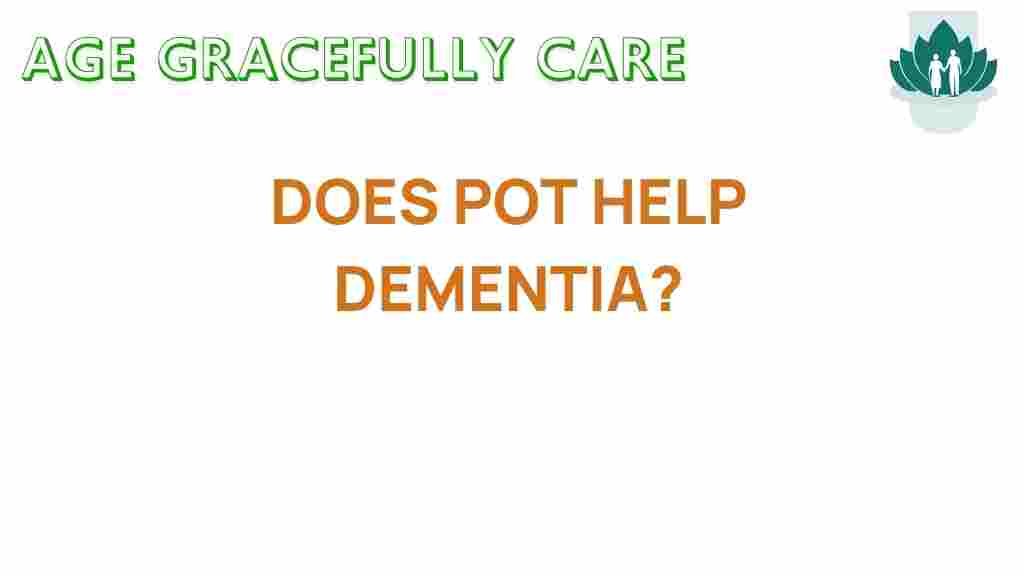Unpacking the Question: Does Pot Help Dementia?
Dementia is a term that describes a range of symptoms associated with a decline in cognitive function, significantly impacting memory, thinking, and social abilities. It affects millions of people worldwide, with Alzheimer’s disease being the most common form. As the search for effective treatment options continues, many are turning to cannabis, particularly its components THC (tetrahydrocannabinol) and CBD (cannabidiol), to explore their potential benefits for cognitive health. In this article, we will unpack the question: does pot help dementia?
The Science Behind Cannabis and Cognitive Health
Research into the neuroprotective effects of cannabis is still in its early stages, but several studies suggest that compounds found in cannabis may offer benefits for individuals with dementia. Here are some key points:
- Neuroprotection: Some studies indicate that cannabinoids can protect neurons from damage, which is crucial in conditions like Alzheimer’s.
- Reduction of Inflammation: Cannabis has anti-inflammatory properties, which may help reduce the neuroinflammation associated with dementia.
- Improvement of Symptoms: Cannabis users have reported improvements in mood, anxiety, and sleep disturbances, which are common among dementia patients.
Understanding THC and CBD
THC and CBD are the two most studied cannabinoids in cannabis. They interact with the endocannabinoid system in the body, influencing various physiological processes. Here’s how they differ and what they may offer:
- THC: The psychoactive component of cannabis, THC may help alleviate symptoms like pain and anxiety, but it can also lead to cognitive impairment in higher doses.
- CBD: Unlike THC, CBD is non-psychoactive and has shown promise in reducing anxiety and providing neuroprotective effects without the high associated with THC.
Research Findings on Cannabis and Dementia
Several studies have been conducted to explore the effects of cannabis on dementia and cognitive decline:
- A 2016 study published in the Journal of Alzheimer’s Disease found that cannabinoids might protect neurons from damage and improve cognitive function in models of Alzheimer’s disease.
- Another study reported that cannabis users experiencing Alzheimer’s exhibited improved cognition and reduced agitation compared to non-users.
- A 2020 survey indicated that many caregivers and patients believe cannabis helps manage behavioral and psychological symptoms of dementia.
Exploring Treatment Options with Medical Marijuana
When considering cannabis as a treatment option for dementia, it is essential to approach it with caution. Here’s a step-by-step guide for those interested in exploring this avenue:
Step 1: Consult with Healthcare Professionals
The first step is to consult with a healthcare professional knowledgeable about cannabis and its effects on cognitive health. They can help determine if cannabis might be a suitable option based on the individual’s specific needs and medical history.
Step 2: Understand the Legal Landscape
Medical marijuana laws vary by location. It’s essential to understand local regulations regarding the use of cannabis for medical purposes, including acquiring a medical marijuana card if required.
Step 3: Choose the Right Form of Cannabis
Cannabis comes in various forms, including:
- Oils and Tinctures: Concentrated forms that can be taken sublingually.
- Edibles: Foods infused with cannabis, offering a longer-lasting effect.
- Vaping: A method that allows for quick absorption without the harmful effects of smoking.
Each form has its benefits, and personal preference should be considered.
Step 4: Start with Low Doses
When beginning cannabis treatment, it’s crucial to start with low doses and gradually increase until the desired effects are achieved. This approach helps minimize potential side effects, especially in older adults who may be more sensitive to THC.
Step 5: Monitor Effects and Adjust Accordingly
Keep a journal to track the effects of cannabis on cognitive health, mood, and overall well-being. This information can be invaluable for discussions with healthcare providers and may help in adjusting dosages or changing products.
Troubleshooting Tips for Cannabis Use in Dementia
While cannabis may offer benefits, it is not without challenges. Here are some troubleshooting tips to consider:
- Monitor for Side Effects: Be aware of any adverse effects, such as increased anxiety or sedation, and report them to a healthcare provider.
- Consider Interactions: Cannabis may interact with other medications. Always inform healthcare providers about cannabis use.
- Stay Informed: Keep up to date with the latest research on cannabis and dementia to make informed decisions.
Conclusion: The Future of Cannabis in Dementia Treatment
The question of whether pot helps dementia is complex and multifaceted. While preliminary research suggests that cannabis, particularly THC and CBD, may offer neuroprotective effects and improve certain symptoms associated with cognitive decline, more extensive clinical trials are needed to establish clear guidelines and safety profiles.
As public interest in medical marijuana grows, it is vital for patients, caregivers, and healthcare providers to engage in open discussions about treatment options. Always prioritize safety, legality, and medical advice when considering cannabis as a potential aid for dementia.
For more information on dementia and its treatment options, visit Alzheimer’s Association. If you’re interested in exploring cannabis further, check out this resource on medical marijuana.
This article is in the category Health and created by AgeGracefullyCare Team
